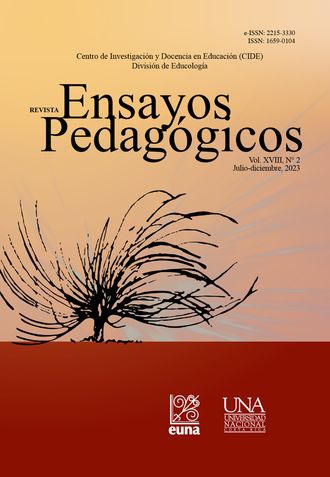Using Infographics to Strengthen Academic Integrity: An Experience of the School of Educational Sciences of the Distance State University of Costa Rica
DOI:
https://doi.org/10.15359/rep.18-2.12Keywords:
academic fraud, academic integrity, ethics and training, higher education, infographic, responsibility, student attitudeAbstract
This article is a systematization of the experience carried out by the Academic Integrity Team (ETIA in Spanish) of the School of Educational Sciences (ECE in Spanish) of the State Distance University of Costa Rica (UNED in Spanish), with the aim of raising awareness of academic integrity as a response to the increase in fraudulent practices that occurred during the year 2020, as a result of the massive virtualization of subjects, on account of the COVID-19 pandemic. Seeking to transcend the traditional punitive approach to academic fraud used as a strategy, two series of ten infographics were produced, under three key axes (awareness training, theoretical, and reflective), which address both regulatory theoretical aspects of academic fraud and plagiarism, as well as surrounding elements of learning that affect academic success. Having said this, the main result of the experience was that the work carried out by the ETIA was reflected in a reduction in the number of complaints about academic fraud and the like filed with the ECE, which suggests not only the relevance of the strategy, but also of the theoretical axes that guided it.
References
Bradshaw, M. y Porter, S. (2017). Infographics: A New Tool for the Nursing Classroom. Nurse Education, 42(2), 57-59. https://doi.org/10.1097/NNE.0000000000000316
Carrera-Umaña, R. (2017). Teoría de la Educación. Innovaciones en un mundo cambiante. EUNED.
Centro de Pensamiento en Integridad Académica. (2018). Hacia una Política de Integridad Académica en la Universidad Nacional de Colombia. Universidad Nacional del Colombia. https://bit.ly/3LY9L08
Crisci, J. V. y Katinas, L. (2020). Las citas bibliográficas en la evaluación de la actividad científica: significado, consecuencias y un marco conceptual alternativo. Boletín de la Sociedad Argentina de Botánica, 55(3), 1-10. https://doi.org/10.31055/1851.2372.v55.n3.28723
Gobierno de la República de Costa Rica. (2020, 16 de marzo). Declaración de estado de emergencia nacional en todo el territorio de la República de Costa Rica, debido a la situación de emergencia sanitaria provocada por la enfermedad COVID-19 N° 42227-MP-S. San José, Costa Rica. https://bit.ly/3xmbWmo
Grande de Prado, M., García-Peñalvo, F. J., Corell, A., y Abella-García, V. (2020). La virtualización causada por el Covid-19: recomendaciones para la evaluación. En M. Cid, N. Rajadell-Puiggròs, y G. Santos-Costa (Eds.). Ensinar, avaliar e aprender no ensino superior: Perspetivas internacionais (pp. 231-250). Centro de Investigação em Educação e Psicologia da Universidade de Évora. https://bit.ly/3eSVELm
Guevara, G., Verdesoto, A. y Castro, N (2020). Metodologías de investigación educativa (descriptivas, experimentales, participativas, y de investigación-acción). RECIMUNDO. Revista científica Mundo de la Investigación y el Conocimiento, 4(3), 163-173. http://bit.ly/3LVO7tF
International Center for Academic Integrity (ICAI) (2021). The Fundamental Values of Academic Integrity. ICAI. https://bit.ly/3JScmGn
Rodríguez, Y. (2022). La integridad académica en el marco de los ambientes virtuales de aprendizaje en educación superior: Fundación Universitaria Konrad Lorenz ubicada en Bogotá, Colombia. Acta ScientiÆ InformaticÆ, 5(5), 1-7. http://bit.ly/3nkcBlU
Romero, M. G. (2020). Enseñanza de programación de estructuras de datos aplicando estrategias didácticas basadas en la teoría de carga cognitiva [Tesis de maestría, Universidad Autónoma de Aguascalientes]. Repositorio Bibliográfico, Universidad Autónoma de Aguascalientes. https://bit.ly/3Bo28cO
Solano, W. y Campos, J. (2013). Percepción del personal docente de la Universidad Estatal a Distancia de Costa Rica respecto de la deshonestidad académica en estudiantes. Revista Innovaciones Educativas, 15(20), 1-22. http://bit.ly/3Kgqsmv
Solano, W. y Campos, J. (2012). La deshonestidad académica en la UNED: Estrategias de detección, abordaje y prevención: “Un acercamiento a la construcción del discurso”. [Estudio realizado en la Universidad Estatal a Distancia].
Universidad Estatal a Distancia (UNED). (2020, 11 de marzo). Sesión Extraordinaria No. 2073-2020 (CR-2020-0473) [Acuerdo del Consejo de Rectoría de la Universidad Estatal a Distancia]. https://bit.ly/3BqpYV9
Universidad Estatal a Distancia (UNED). (2019, 31 de octubre). Acta No. 2776-2019 [Acta del Consejo Universitario de la Universidad Estatal a Distancia]. https://bit.ly/3SgKsXl
Universidad Estatal a Distancia (UNED). (2018). Ejes transversales en las asignaturas de la UNED. Programa de apoyo curricular y evaluación de los aprendizajes (PACE), UNED. https://bit.ly/3BfDVoH
Universidad Estatal a Distancia (UNED). (2012). Reglamento General Estudiantil. https://bit.ly/3DwhSMN
Downloads
Published
How to Cite
Issue
Section
License
Copyright (c) 2024 Ensayos Pedagógicos Journal

This work is licensed under a Creative Commons Attribution-NonCommercial-NoDerivatives 4.0 International License.
Ensayos Pedagógicos is subscribed to the Attribution-NonCommertial-NoDerivatives 4.0 International Creative Commons Licence, which allows both authors and readers to freely download, store, copy, and distribute the final approved publisehd version of the manuscript (post-print) as long as this is done without commercial purposes, no derivative works are generated, and the source and author are mentioned. As well, Ensayos Pedagógicos declares that authors will remain the rightful owners of the copyrights of their work in perpetuity.







